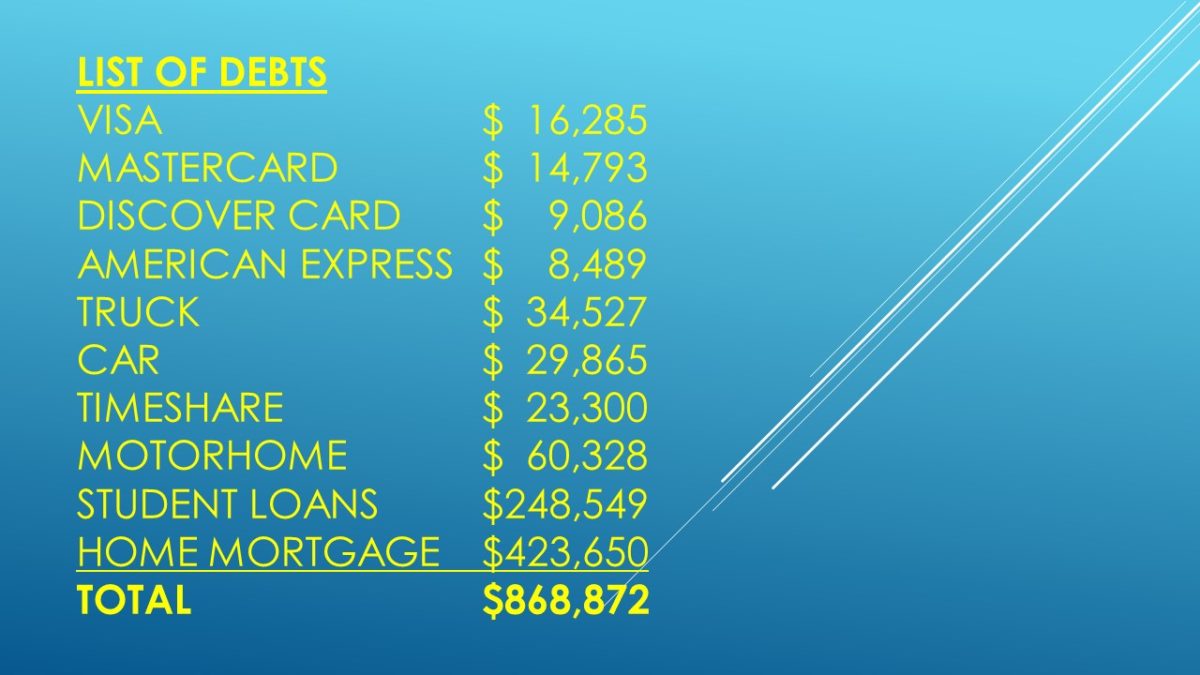Doctors today are drowning in debt. That’s not a big revelation, but how did we get here? We moved in a little at a time, like a lobster in a pot of water slowly increasing in temperature until it finally dies when the water gets too hot.
Think back to a few months before your high school graduation. Standing in the kitchen with Mom and Dad, reading your first financial aid/student loan package from Dream College University. Is your hand shaking from the opportunity or in fear of the looming debt? You begin to wonder:
How will I ever pay it off?
How much will the interest total?
Can I afford this?
It’s a little scary, taking on debt for the first time. Maybe even horrifying.
You conquered the fear and took the plunge, joining the ranks of other Americans in debt. When the sophomore financial aid package arrived, it was a little easier to tack on a new loan. After all, nothing bad happened with the last one. Some big dude with a bat didn’t show up to break your legs for not making any payments. The bank wasn’t sending any nasty letters. Everyone was saying it would be easy to pay it off after graduation, when the big bucks would be rolling in.
So you did it again, adding the next student loan to the debt pile, and still nothing bad happened. Each year it got easier and easier to add more debt. You gradually became desensitized to the debt. Something horrible, initially, had become acceptable.
Fast-forward to the final year in medical school. Eight years of “add it to my debt and I’ll pay it later” have passed. It was so easy to add more debt the eighth year. What will it matter if you borrow a little bit more?
If you take a moment to reflect on your borrowing years, you realize how it happened so gradually. You became so numb to the idea of debt, it meant nothing to you anymore. For eight years, you added to it and nothing happened. Life went on, and you kept getting what you wanted, always thinking it would be easy to pay later. This laissez-faire attitude sets you up to make some bad decisions.
When the real estate agent talks you into looking at a much more expensive house than you were considering, taking on the extra debt is no big deal. Debt is nothing, just toss it on the pile. When the car salesperson shows you the proper choice for a doctor, he can easily convince you to drive away in your dream car with those “small” monthly payments. Debt is nothing, just toss it on the pile. When you drive by the RV lot and see the perfect motorhome, you’re sure you can handle the payments. You’ve not had any trouble—yet. Debt is nothing, just toss it on the pile.
Only after you begin to face the consequences of piling on all this debt, do you realize what a monster you have created. When you reach the point where the easy monthly payments are not so easy anymore, you begin to think about debt in a new light—but now it’s too late. You already owe the money. You made the deal. You signed the papers. You are hooked like a Chinook salmon at the end of a fishing line.
Most doctors have seen a long-term diabetic patient sometime during their career. After many years of out-of-control blood sugar, nerve damage begins to take place. The patient begins to lose feeling in his or her feet.
Tim was one such patient with diabetic neuropathy, who bought a new pair of shoes for a vacation to Russia. He walked all over Saint Petersburg in those new tennis shoes. He came home and noted a fever and a bad smell coming from his foot. Those new shoes had caused a blister on his foot, but he couldn’t feel it due to the neuropathy. As he continued to walk on the blister, the damage got worse. Later, the blister popped and the wound became infected. The entire bottom of his foot was lost.
Informing Tim of the need for a below-knee amputation was not easy. He would have none of that. No one was going to cut off his foot. He had been a diabetic for many years and took excellent care of his feet, despite the neuropathy, and he wasn’t going to lose one now. He couldn’t feel the problem and he couldn’t see the problem, but the problem was there nonetheless. The top of his foot, which was all he could see, seemed a little red. I got a mirror so Tim could see the bottom of his foot. Only after personally seeing all the skin and subcutaneous tissue missing, and the tendons and bones visible, did he finally realize there was a problem—a serious problem.
This situation is similar to what debt is doing to doctors today. We don’t see the problem, we don’t feel the problem, and so what’s the big deal? Everyone else is doing it. Doctors are suffering from Debtabetic Neuropathy:
Debt is like poorly fitting shoes on numb feet.
Your financial future is rotting away
and you’re not even aware it’s happening.
Eventually the smell gets your attention, but by then it’s too late. A bankruptcy (amputation), divorce, or even a suicide may be looming on the horizon.
Don’t let Debtabetic Neuropathy
get a foothold on you.
We need to stop thinking of debt as neutral. Even debt some people consider “good” can bankrupt you. Debt is usually a bad thing, a burden, and it is hurting more doctors every day. If you keep in mind that there is no such thing a “good” debt, your life will be much nicer.
Make a concerted effort to get out of debt once and for all, and that includes your home mortgage. Become totally debt free! However nice you think that might be, it is even better than that. Then all the money you earn is available for you to use now and not promised for things you did in the past. Set out to make this year the year you change your financial life forever.
Get a better understanding of the perils of debt by reading my award-winning book, The Doctors Guide to Eliminating Debt and totally regain control of your finances.
Doctors earn a nice living and there is no reason for them to be slaves to debt. Get out of the debt swimming pool before you drown.









